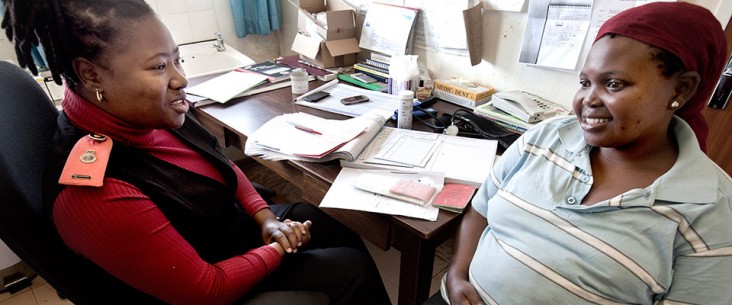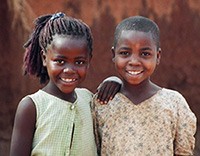- What We Do
- Agriculture and Food Security
- Democracy, Human Rights and Governance
- Economic Growth and Trade
- Education
- Ending Extreme Poverty
- Environment and Global Climate Change
- Gender Equality and Women's Empowerment
- Global Health
- Water and Sanitation
- Working in Crises and Conflict
- U.S. Global Development Lab

At a Glance
The Critical Roles of Civil Society Organizations
As the fight against HIV and AIDS shifts from an emergency response to a long-term response, the role of civil society organizations (CSOs), including community-based, non-governmental and faith-based organizations in HIV and AIDS prevention, care and support efforts becomes even more important. Civil society plays a critical role in HIV and AIDS advocacy and service delivery. Without civil society, fewer services would be available to key populations, people in remote areas would have to travel further for services and many of the gains made in treatment because of civil society advocacy would not exist.
What Does Civil Society Do?
There are at least two critical roles CSOs play globally and in specific country settings: advocacy and service delivery.
“The term civil society [refers] to a wide array of non-governmental and not-for-profit organizations that have a presence in public life, expressing the interests and values of their members or others, based on ethical, cultural, political, scientific, religious or philanthropic considerations. Civil Society Organizations, therefore, refer to a wide array of organizations, community groups, charitable organizations, faith-based organizations, professional associations, and foundations.”
[World Bank]
Advocacy
Civil society organizations have extensive experience in advocacy related to HIV and AIDS. Whether it is a global campaign for universal access to antiretroviral therapy or a national campaign to strengthen men who have sex with men networks to advocate for increased and improved services, CSOs can point to many successes in a variety of settings.
Aspects of advocacy related to HIV and AIDS in which civil society is engaged include, but are not limited to, increasing accountability and transparency of a government’s national commitments and planned results; reducing legal and policy structural barriers to a quality HIV response; reducing stigma and discrimination for key populations; supporting civil society networks/coalitions; and promoting the ability of citizens to recognize and demand quality services in their communities.
Service Delivery
Civil society organizations work across the spectrum of the HIV and AIDS response. Whether it is faith-based clinics and hospitals providing a range of HIV and AIDS services, medical associations supporting clinicians or community organizations supporting care and support for orphans and vulnerable children, it is clear that CSOs play a critical role in supporting their communities, countries and beyond.
USAID’s Response
The U.S. Agency for International Development (USAID) has been funding CSOs for as long as the Agency has existed. In many countries, USAID is the major donor for HIV and AIDS and the civil society that supports the HIV and AIDS response. Over time, our theory and practice in supporting CSOs has changed. USAID has moved away from providing technical assistance to improve an organization’s ability to implement our projects to an organizational development approach where the goal is to improve the ability of the organization to function independently and support its own activities long term. This will also improve an organization’s ability to implement our projects and makes it a stronger body functionally. USAID continues to implement projects to build organizational capacity and sees this as a critical piece of what we do. It is also an important component of our strategic movement toward country ownership.
In China, through the Regional Development Mission Asia, USAID supported an advocacy program for men who have sex with men (MSM) at the provincial and district levels in Guangxhi and Yunnan provinces. Through efforts of USAID and its partners, MSM groups developed skills that allow them to better support their members/beneficiaries, measure and report on their work and communicate and coordinate with government and others. The work has made these groups invaluable partners to the provincial and local governments and facilitated expansion of available quality HIV and AIDS services for MSM. This continues today, beyond the life of USAID funding.
Current Programmatic Highlights
Civil society service delivery and capacity building are being incorporated into many of our technical activities. With growing focus on sustainability, a more sustainable approach to development is being incorporated into USAID programs and projects across the Agency. Some examples of the areas in which USAID/Washington is being engaged include the following:
Ananda Marga Universal Relief Team (AMURT)
As a partner under the New Partners Initiative, AMURT received service delivery and capacity building support for work in Kenya. AMURT worked with local partners to provide care and support to orphans and vulnerable children (OVC), with the goal of preventing the transmission of HIV and bringing sustainable services to those infected and affected by HIV. AMURT’s OVC activities focused on improving educational opportunities and health care and providing psychosocial support and legal protection that reached thousands of children. Prevention activities focused primarily on youth and reached tens of thousands of people. AMURT continues to support OVC and HIV prevention activities in Kenya, other African countries and elsewhere through USAID and other funding.
USAID Forward
USAID Forward is an Agency-wide agenda to promote sustainable development through high-impact partnerships with institutions, private sector partners and CSOs through increased investment and technical assistance.
AIDSTAR-Two
The AIDSTAR-Two Project contributes to stronger, more sustainable country-led HIV and AIDS programs by offering systematic organizational capacity building assistance. The project supports local non-governmental organizations, CSOs, public sector institutions and networks that work with the U.S. President’s Emergency Plan for AIDS Relief (PEPFAR) to maximize the impact of HIV and AIDS programs.
Local Capacity Initiative (LCI)
The Local Capacity Initiative will provide funding to PEPFAR country and regional teams for direct support to local CSOs in support of the goal of enhancing country ownership. LCI is a follow-on program to the New Partners Initiative (NPI).
Through LCI, for example, the mission in Namibia conducted an assessment to understand the current capacity of U.S. Government-funded HIV and AIDS CSOs to sustain their efforts in a future with fewer donors and to explore other funding sources.
Training Resources Group (TRG)

The Training Resource Group works to develop an organization’s capacity, with the goal of improving the performance and impact of U.S. agencies and USAID teams in the missions in the implementation of PEPFAR programs. TRG and PEPFAR provide a range of organizational development services to promote country ownership of sustainable HIV programs through:
- Conducting of situational assessments, analysis and planning
- Team support and skill enhancement
- Coaching of U.S. Government and PEPFAR staff
- Collecting of tools and resources
- Disseminating of information to promote knowledge sharing
- Coordination with USAID/Washington and the Office of the U.S. Global AIDS Coordinator







Comment
Make a general inquiry or suggest an improvement.